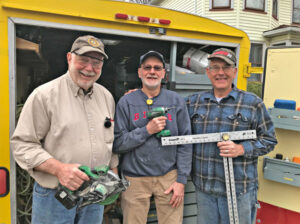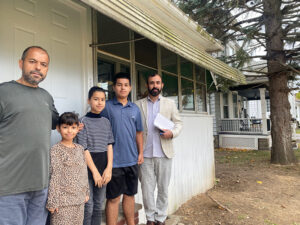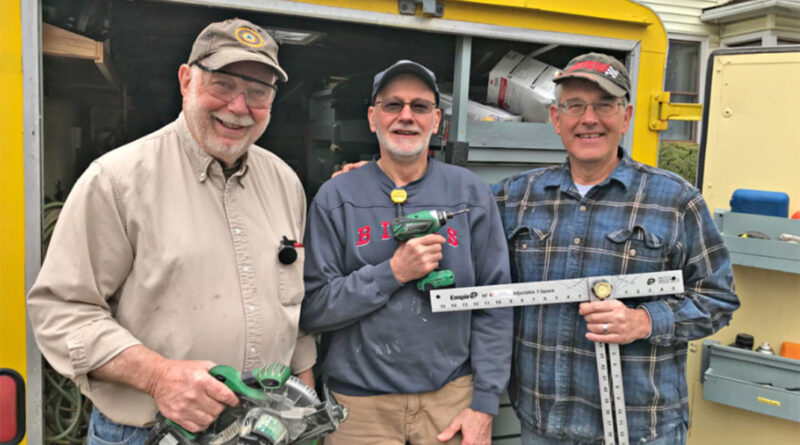The Longest Journey
Local nonprofit helps refugees to settle in the Rochester area
By Lynette M. Loomis

Mike Coniff, 77, founder and CEO of Rochester Refugee Resettlement Services, says there are some similarities but far more differences for current refugees compared to those who immigrated to the U.S. a century or so ago.
“America still represents economic opportunity and education. But people also want to come to the U.S. for safety,” he said. “In many of their countries, there is ongoing civil war, oppression and persecution because of ethnicity, faith or culture.
“Mary’s Place, a refugee outreach center, was helping refugees with immediate needs such as clothing, food and English classes. I had left my position as a city of Rochester employee and believed there was more we could do to help with housing and longer-term needs to help refugees assimilate. The closing of Kodak meant people moved away leaving many vacant houses. We looked for places that needed repair but were structurally sound to rent to refugees.”
Coniff said Rochester Refugee Resettlement Services has a team of a dozen people who help more than 100 people find jobs annually. One training program helps adults and teens learn the skills necessary to be a good employee, especially those who grew up on farms or in camps. These people may need to learn basic living skills such as how to use electric or gas stoves. Others learn English and enroll in education. Other refugees were well-educated in their home country and held professional positions but needed training in the U.S. The team sees 15-20 people five days a week. Volunteers from the community, churches, schools and scouts do everything from fixing houses for rent or purchase to transportation and events.

“I can tell you — our potlucks are amazing,” he said. “The different smells, tastes and colors of the food, it is a privilege to share our cultures.
“People ask me who I work with regularly. I always say an amazing and diverse team whose skills and experience complement each other. They are some of the most amazing, talented and committed people I have ever known.”
Team members say Coniff has created a culture that promotes this camaraderie.
“Listening to the stories and struggles of our refugee clients can be disheartening but our team supports one another every day,” he added.
Berka Mou, 62, case manager, is a Moroccan native and worked as a French teacher for the country’s university system. He came to the U.S. for more opportunities and stability in his life. He taught French, Arabic and Spanish at Spencerport High School. He speaks five languages and also is fluent in American Sign Language. “I think it’s important for refugees to see the diversity of our staff when they arrive at our door. We are not a fancy place, but we are a safe place. We want to make sure everyone feels welcome,” he said.
Born in Greece, Natalia Argitis collaborates with interns and volunteers.
“Being an immigrant myself, I was happy to have gotten my sociology degree from Queens College. I believe it’s my duty to honor our refugee families and their strengths. They appreciate the help they receive from ‘strangers,’” Argitis said.
Zia Rahman Srack, case manager, worked for the US embassy in Afghanistan.
“When I lived in Afghanistan, living circumstances truly took a toll after the fall of the government. When the Taliban took power, my life was in danger because of my affiliation with the U.S. government through my job at the U.S. embassy. I was lucky to get a special immigrant visa to protect myself and my family,” Srack said. “Working on a team where we can share ideas and knowledge is a privilege. Most of our clients are refugees and a few seek asylum. We work one-on-one with our clients. Their success is our success.”
For 20 years, England Abdi and her parents lived in a camp in Kenya. She was born there and lived at the camp until she was 11. She also lived in Nairobi before immigrating to the U.S. with her grandmother. She has a master’s degree in social work and helps families improve their living conditions by connecting them with community resources.
“Some people are hesitant at first to trust us. They fear we will take their children away from them. Now when they come in, they bring their kids and smile,” Abdi said.
Coniff works closely with the executive director, Djifa Kothor, who came from Togo more than 20 years ago. He is a graduate of St. Lawrence University. Kothor manages the daily operations and the housing program. To keep the physical plant running smoothly at the center and the rental units, the center relies on part-time help from Aung Ngae, Day Thoor and Heynaesoe Tong, who fled from their homelands to the U.S. for a better life. Each would say how excited and grateful they were to receive their green cards so they could secure work.
Coniff explained that hearing some of the refugees’ stories can be hard.
“Some have told us that people were starving and soldiers would come into the camp and drag people away. Everyone lived in terror. One man relayed that he saw a man beheaded and his head held up on a pole as a warning to others. A pregnant woman was sliced open and her baby was cut out. The acts of cruelty are almost beyond words. It is so important that our staff can depend upon each other for moral support, translation and encouragement,” he said.
The Refugee Resettlement program relies on grants, donations and volunteers. Refugees pay rent for their homes and apartments and may be able to receive grants for homes if they qualify for a mortgage.
What does Coniff do when he is not checking out possible rental properties for or advocating for refugees?
“I like to paint and find it soothes my soul,” he said. “I am also active in Sacred Heart Cathedral.”
He said it can be difficult for American-born citizens to understand the horrors some refugees have witnessed or experienced. Beheadings and execution, rape, beatings and torture, imprisonment, starvation and separation of parents and their children.
“I think my staff and I would ask people to get to know their neighbors before passing judgment. See the people for who they are, not what you expect to see,” he said. “Create a safe place for people new to our communities. Be kind. The saying ‘’There but for the grace of God go I’ seems appropriate.”
For more information, visit www.rochesterrefugeeservices.org.

